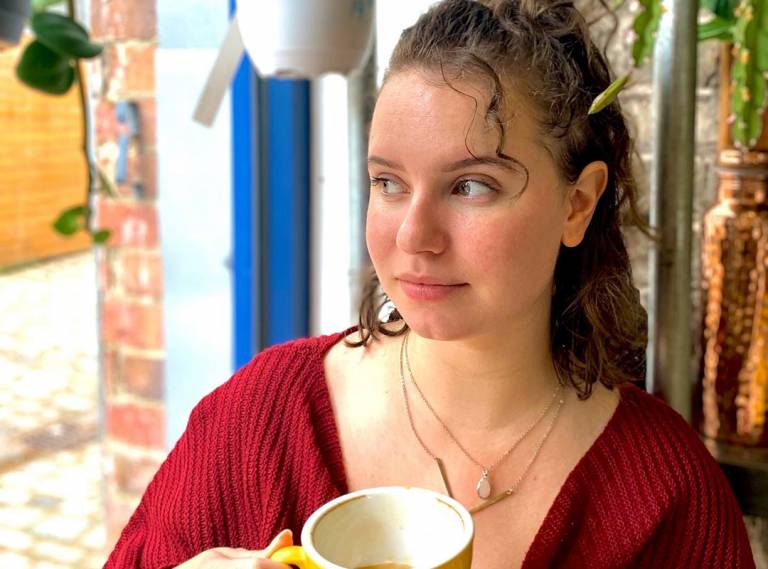7 (surprising) things I learned studying Anthropology at UCL
Does an Anthropology degree make you think coding, journalism or documentary filmmaking? Riani Kenyon, Anthropology BSc alumna, will tell you about some skills you might not expect to gain.

5 October 2021
Ever wondered what an Anthropology degree actually teaches you? I’m here to tell you about some of the skills you might find surprising for the degree. Yes, we do read old writings scribbled by middle-class white men on remote islands, but that’s not all we do. Here are some of the things I learned studying Anthropology at UCL that I did not expect:
1. Coding
Yes, coding! In my first year, one of my compulsory modules was ‘Biological Anthropology’. This is a scientific module which required us to learn R Coding (which is statistical coding) to create visual aids, such as graphs, to illustrate our argument in essays. Yes, there were many emotional breakdowns, but they were all worth it because now I know a coding language! This way, if I decide to learn other coding languages (such as Python or Javascript) I have some experience under my belt and I won’t be as intimidated.
2. Film creation
Did you know that David Attenborough studied Anthropology? Yeah - he’s the prime example of a documentary filmmaker, so it actually makes sense that this is a part of an Anthropology degree! The ‘Researching the Social World’ module is a practical documentary filmmaking course, which teaches you the basics of filmic storytelling. The fundamentals that are taught include the ethics of documentary creation, conducting interviews, using professional equipment (such as a camera, tripod and microphone). I was always tempted to start a YouTube channel, but learning all the technical skills from scratch by myself was truly daunting! This course gave me the confidence boost I needed to start that YouTube channel by teaching me the basics. Maybe one day you could be the next David Attenborough…
3. Video Editing
With the ‘Researching the Social World’ module you also have the option to learn how to edit all the wonderful videos you filmed! This additional training focuses on the basics of PremierPro editing and there are weekly workshops that you attend to help make your documentary’s story flow. You are also provided with a computer that has the editing software downloaded, so you don’t have to pay anything extra!
4. Graphic Design
This skill is more self-taught, but it was encouraged by the ‘Material and Visual Culture’ module in first year. This module provides a chance to do real fieldwork, in the sense that you go out in London, observe the public, create fieldwork notes and then present your findings in a lab book. This lab book could be in any format, but had to visually illustrate the data collected in the field. Some students used PowerPoint presentations, others used Instagram, but I decided to create a magazine-style delivery by using Canva to make it really pretty. If you haven’t tried out Canva, I highly recommend it! It makes graphic design super easy and you can create anything, from eye-catching posters, impressive CVs and even YouTube thumbnails!
5. Excel Spreadsheets
Now, you might be thinking, who wants to learn Excel? But trust me, every company requires at least some level of Excel experience and knowing how to make a pivot table will come in handy. Volunteering in the Anthropology department’s Ethnography Collection provides a safe space where you can meet people from the department who you normally wouldn’t, engage with the thousands of artefacts and learn how to use an Excel spreadsheet with zero judgement! Sounds great, right?
6. Journalism skills
From conducting the most effective field work to writing articles for the Anthropolitan, the Anthropology department provides various tools for you to sharpen your journalism skills. Foundational workshops on how to conduct interviews, participant observation and ethical data collection is all guaranteed with a degree in Anthropology. However, there are other avenues you could explore, for example writing for the department’s magazine or becoming a student ambassador. The reason why I’m writing this article is because I am a student ambassador and this role has taught me so much. From writing articles (such as this) to interviewing lecturers on their modules or filming book and film reviews! The skill of storytelling and clear communication is honed around every corner of the department.
7. Podcast recording
Another storytelling avenue is podcasts! In the ‘Documentary Radio’ module, you are taught the ins-and-outs of recording a podcast, interviewing candidates and seamlessly editing what you’ve recorded. Admittedly I haven't taken this module myself, yet, but (here’s where my previously mentioned interview skills come into play) I asked a fellow student about their experience of the module and they explained you learn how to effectively use a microphone, utilise REAPER64 sound editing and (once again) interview skills! Honestly, after our conversation, this module is at the top of my wish list for my final year - which module is at the top of your list?
All the skills I’ve learned within the department opened up so many doors for me. From film creation to podcast recording, coding to Excel, the UCL Anthropology department is a microcosm of knowledge and skills outside of essays and reading old scribbles made by middle-class white men on remote islands. So, if you’re looking for a degree that will diversify your future, look no further and apply to Anthropology at UCL!
 Close
Close

